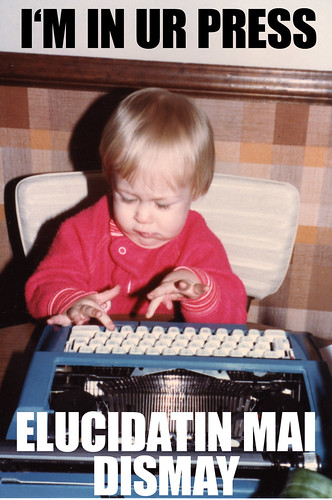Bogosian is always trying to get at the heart of complacency, but I think he challenges his readers and viewers to understand that complacency is not always what it seems. In Suburbia his characters were washed-up twenty-somethings -- too young to actually be washed up at all. Talk Radio has a slightly different focus. Barry Champlain may be washed-up, he may not. He may be brilliant, he may be a farce. But he's got a mouthpiece and that's enough to keep him going.
While reading it I tried to put my finger on exactly what the relevance of this play for a class on the commenting feedback loop was. Certainly the endless loop of callers who were supposedly interacting with each other through Barry's show were "commenting" on some level. But those comments weren't able to build off of each other in any meaningful way. Instead, Barry served as gatekeeper -- cutting off everyone but himself and yet no more or less profound or stupid as his callers.
The callers are part complacent, part oblivious, part self-obsessed, and part oblivious. But that doesn't mean that their impact is negligible. It only means that Barry is the broadcast tower that projects them. I believe Bogosian's ultimate focus is on the loneliness of life and the search for meaning. This is not a dramatic departure from his characters in Suburbia, either. Those kids were just a little nicer to each other as they stumbled around looking for the path to meaning.
As readers we can judge them on their substance, but that seems shortsighted. Talk radio is not journalism. Their is no reporting in the mouthpieces that sound off, or let their listeners do the same. Instead its like group therapy. Which can have a greater impact on public opinion than the facts and figures. So the hard-nosed who/what/where/when/why of journalism has to compete against the analysis and exposition of the neurotic self. On a Birmingham School level, we have to recognize that giving a broadcast tower to expound upon the inane inner workings of a woman afraid of her garbage disposal is not something that can be so quickly dismissed. Listeners will interact with texts (whether auditory, on paper, or visual) in a way that is not purely passive.
But contrast the forum for "discussion" on the talk radio program with the breadth and scope of the Internet. There is no Barry standing in the way to hit the "off" button. Granted some sites are moderated and others are not, but ultimately whether you are terrified of your garbage disposal or convinced the panda bears are dying off you now have a way to connect with others who agree with you. And no one is going to hang up on you and shut it down. (I should preface this with the point that this assumes that we maintain net neutrality).
The content of Barry's show don't get us any closer to solutions. In a lot of ways the play is a classic Gen-X reactionary text that leans towards frustration and apathy over any sort of concrete action. And as I was reading I was reminded of the following quotes from this recent post on TechPresident:
Imagine for a moment being one of us. Taught in school that all people are created equal, that all countries are sovereign, that freedom, democracy, and capitalism are embraced by all people and nations because they are ultimate ideals that allow us to prosper and live as we choose in the pursuit of happiness. Old enough to read the New York Times online and blog on Huffington Post, we see a very different world. Equality? Not for the poor, not for LGBT. Capitalism? It appears to have been a house of cards recklessly constructed by greed for the benefit of a few. Sovereignty? Not for resource-poor or oil-rich countries. Ideals? Not for the media or our political and business leaders.
...
The problems and the contradictions being left to us are so big that there are no easy answers. It appears that everything has to be undone, before it can redone. So let us figure out how we want to proceed. Let us "waste" our time like Mark Zuckerberg building a 150-million person online network because it may be the only hope we have. Your generation doesn't know what it means to be a global citizen the way our generation will have to. And those values you taught us, they seem pretty empty when you don't act on them yourselves. If you want us to change the world, don’t look at your sixteen-year-old listening to an iPod while writing on Facebook and watching YouTube and yell at him that he's wasting his privileges. Instead, start cleaning up your own messes. Lead by example. End your own hypocrisies. Start caring about the rest of the world and not just yourselves.
What do you think?




